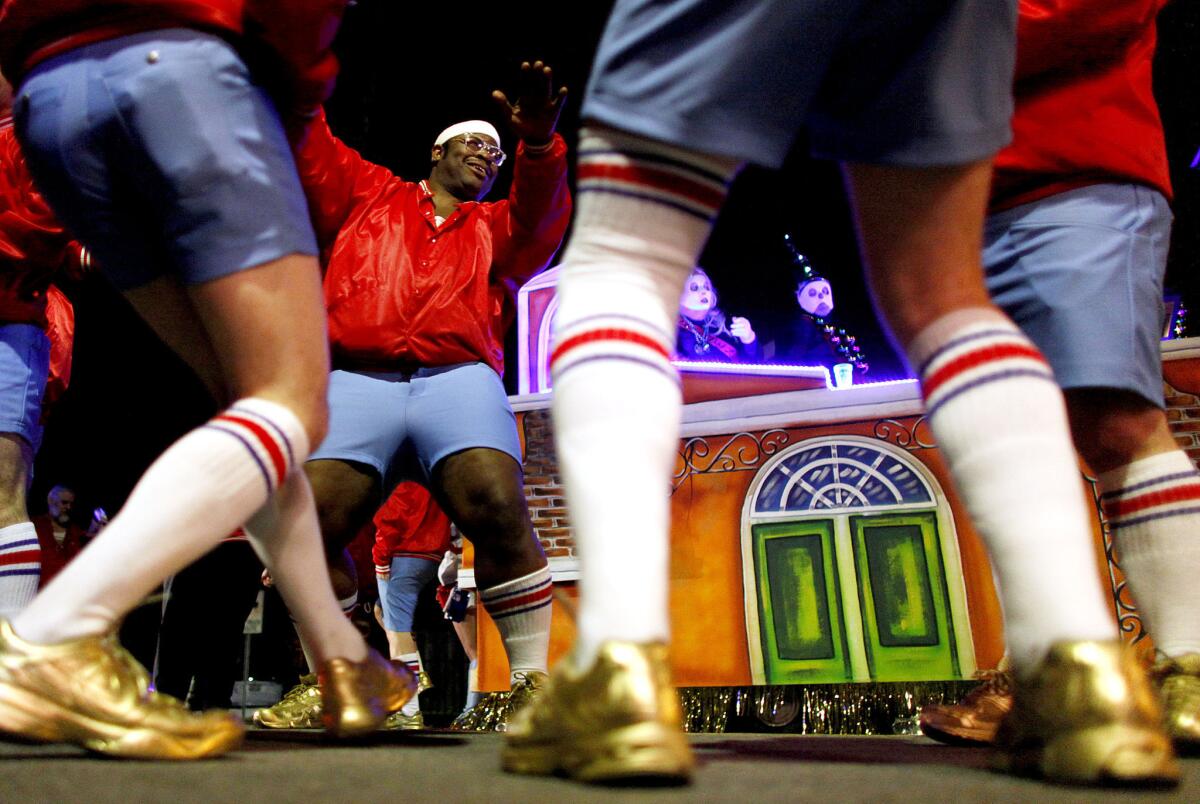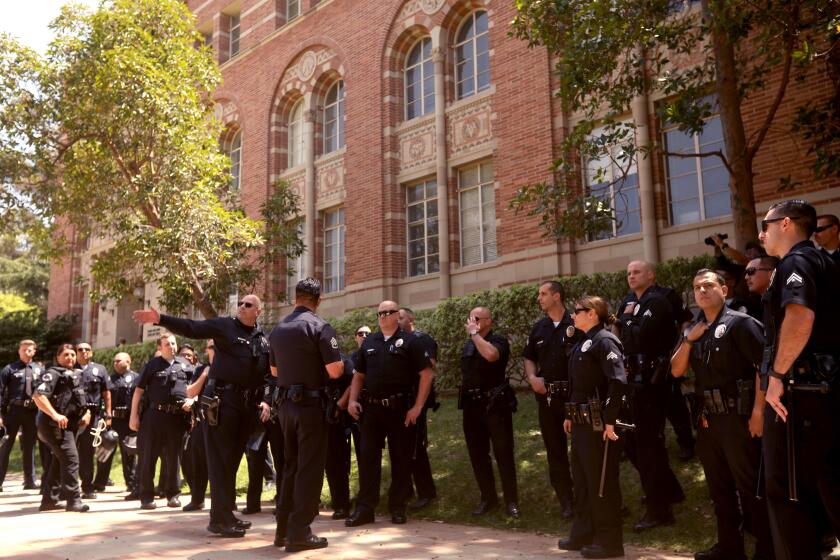Setting Times stories to music: From Nina Simone to Phoenix

Perhaps appropriately for this music-mad editor, two of this week’s Great Reads were about dancing. (And no, that’s not why they were chosen. The writing in both happened to be lovely.)
The first, which ran Tuesday, was all about the joy of being silly, about letting go and having fun. Yes, you may be 6 feet tall and weigh 300 pounds, but you can put on tight polyester blue shorts like your high school coach used to wear and dance with abandon in front of thousands of people.
The second story, which ran Thursday, was more spiritual. It told how California’s drought has one town looking for relief through the ancient ritual of the rain dance. But even that story had moments of silliness, including a water-spitting ritual that became a kind of New Age water fight. Something in the movement of dance frees people, doesn’t it?
Recently I went to a concert where people stayed in their seats the entire set despite music that demanded to be danced to. That led to a kind of tyranny of the seated, because you couldn’t stand up without blocking the view of the person behind. Finally, I could bear it no longer and found a spot near the sound board with no one behind me, and danced.
I thought of that concert when I read this quote in the rain dance story: “My mother told me that when ceremony and dancing end, the world ends. I believe that.”
I believe that too.
Anyway, in these roundups of the week gone by, I’d like to offer the first paragraphs of each Great Read (or, as they’re known in print, Column One) -- maybe they’ll buy your eye and you can settle in for a good weekend read. And you’ll also get the songs that inspired me while editing the stories, or reading them later if my fellow editor Millie Quan ushered them through. A story soundtrack!
#
Monday’s Great Read:
We held Monday’s story because of our boffo Oscars coverage.
#story soundtrack: How about a song for the Oscars? “I’m an Actor,” by Phoenix.
#
Camaraderie, goofy moves fire up dance troupe
Dante Hale is a large man. High school fullback, pro-wrestling hopeful, nightclub bouncer large, all of which he’s been.
Now, on a cool Saturday night, Hale fidgets in a mall parking lot in this town southwest of his home in New Orleans. All 6 feet and 300 pounds of him has been poured into a white tank top and baby blue polyester shorts like those favored by high school wrestling coaches in the ‘80s.
“You know, I’d like to have some anatomical anonymity,” Hale complains of the tight shorts. “I don’t want to be responsible for anyone’s therapy bills.”
Hale’s reprieve comes as about 90 other men surround him. They are dressed identically: white terry cloth headbands, red satin bomber jackets open to the belly, knee-high white tube socks and sneakers, spray-painted gold, that glow softly against the concrete.
They are the 610 Stompers, New Orleans’ only all-male marching dance troupe. Doctors, lawyers, geochemists, math teachers and a pedicab driver fill the roster. Most are mustachioed, middle-aged and soft around the middle. They love Patrick Swayze movies, and the music of Michael Jackson, Sir Mix-A-Lot and Marky Mark.
Hale, sporting a pinkie-wide mustache, is part of the rookie crop of 20 who came on board in August. The 35-year-old tried out on a lark because a friend is a Stomper, and was quickly drawn in by the camaraderie.
The Stompers dance at charity events, bars and halftime shows. But the parades of Mardi Gras season are their Broadway run. Their months of training build to performing extravagantly goofy dances over six-mile-long parade routes.
#story soundtrack: “Safety Dance,” by Men Without Hats. Sorry to do this to you, but it was in the story and I couldn’t resist. Go ahead, you know you want to move your arms, Safety Dance style.
#
Tribal judge works for Yurok-style justice
Abby Abinanti squints at her docket. “The court is going to call — the court is going to put on its glasses,” she says dryly, reaching to grab her readers and snatch some candy from a staff member.
As chief judge of the Yurok Tribal Court, Abinanti wears no robe. On this day, she’s in jeans and cowboy boots, her silver hair spilling down the back of a black down vest. In contrast to her longtime role as a San Francisco Superior Court commissioner, she doesn’t perch above those who come before her; she shares a table with them.
“Hi, big guy. How are you doing?” she softly prods a 29-year-old participant in her wellness court, which offers a healing path for nonviolent offenders struggling with substance abuse.
Abinanti has watched Troy Fletcher Jr. battle bipolar disorder and methamphetamine addiction, land in jail and embrace recovery under the tribe’s guidance. She’s known his grandmother since before he was born.
Though that would be cause for recusal in the state system, here it’s pretty much the point. Her most common question for court newcomers: “Who’s your mom?”
“Here we have a village society,” Abinanti says of California’s largest tribe, “and the people who help you to resolve your problems are the people you know.”
Native American jurisprudence has evolved since tribes began to regain their sovereignty, returning to traditional values of respect, community support and responsibility, and collective healing — for victims, perpetrators and the circle of lives they touch.
Abinanti, who in 1974 became the first Native American woman admitted to the State Bar of California, has been at the forefront.
#story soundtrack: “Touch ‘Em With Love,” by Bobbie Gentry. Wow, the hair. The outfit. The sliding dance moves. Yes!
#
Turning to Native rain dance in time of drought
The woman in line at the bank said she had already sold all her cattle and was now selling her land.
It was one too many tales of drought hardship for Laynee Reyna, also known as She Who Makes Things Happen — a name given to her by a shaman decades ago.
She felt a great spirit seize her. In the crowded bank lobby, the 79-year-old raised her arms.
“Everyone in this town has got to come together and pray and dance for rain, and we’ve got to do it now,” she said.
Teresa Lavagnino, depositing checks at a teller’s window, rushed over.
“Can you do it? Can you make that happen?” she asked. “I can spread the word.”
The first San Juan Intertribal rain dance was held the next Sunday, two days after Gov. Jerry Brown declared a state drought emergency.
About 75 people, including the mayor and the local priest, formed a circle on the lawn of Old Mission San Bautista — quite a crowd in a city of 1,900.
“In a small town, when you call a rain dance, word gets around,” said Ray Sanchez, a barbecue chef and construction worker of Apache heritage.
Reyna, silver-haired and yoga-slender, burned sage in an abalone shell. Sanchez and others beat drums. The circle danced clockwise, which Reyna said attracts low-pressure systems.
“We know it is our disrespect for Mother Earth that brings this drought. We humble ourselves. We call out for rain,” she prayed.
#story soundtrack: “I Think It’s Going to Rain Today,” by Nina Simone. Many have covered this song, but I like her version the best.
#
Immigrants turn to job agencies for the American Dream
Wedged between a travel agency and a hair salon off one of Monterey Park’s busiest streets, Honesty Employment Agency has no English sign.
There one recent afternoon, three young men lounged on black leather couches, chatting in Mandarin about jobs in distant states.
“Dallas is very good, if you know a little English,” said the owner, Mimi Chen.
“I’m afraid it won’t work out, and I’ll end up going for nothing,” replied one man with spiky hair and a shy manner.
The phone rang, and soon Chen was niftily managing two conversations at once, a cellphone pressed to one ear, a land line to the other. She scrawled job listings in one of the notebooks stacked on her desk. Everyone calls her “Sister Chen.”
“I have a stir-fry cook right here. He can do any job,” Chen said before handing the phone to the cook for a quick interview with a restaurant owner.
Here in this bare room, where a map of the U.S. is one of the only decorations on the walls, a young man newly arrived from northeast China can find work washing dishes in Minnesota or Utah for 12 hours a day, six days a week.
Honesty — official name: Xin Xin Service — is one of at least a dozen employment agencies near the intersection of Garvey and Garfield avenues that are gateways to a hidden economy, supplying Chinese-run businesses around the country with cheap labor.
#story soundtrack: “Work All Day,” by Portugal. The Man. This has a trudge-trudge feel, but also a dancing groove. Loving it.
#
If you have ideas for story soundtracks of your own, tweet the title and artist to @karihow or @LATgreatreads with the hashtag #soundtrack.
More to Read
Start your day right
Sign up for Essential California for news, features and recommendations from the L.A. Times and beyond in your inbox six days a week.
You may occasionally receive promotional content from the Los Angeles Times.






